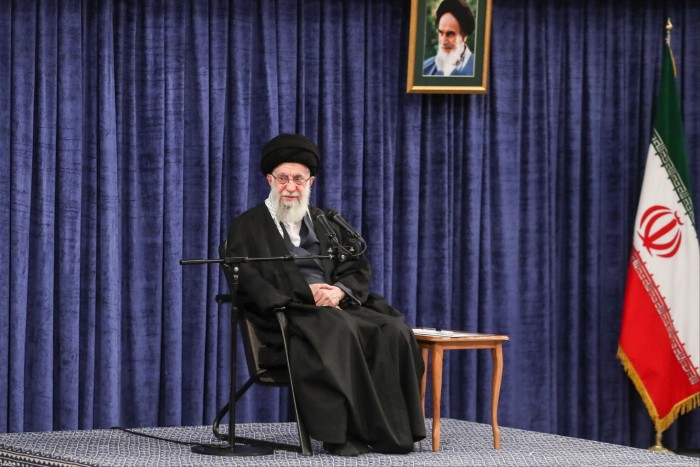Israel and Iran pull back from the brink
Unlock the Editor’s Digest for free
Roula Khalaf, Editor of the FT, selects her favourite stories in this weekly newsletter.
Almost immediately after blasts erupted over an air base near Isfahan in the early hours of Friday, Iran did its utmost to play down Israel’s retaliatory attack against the Islamic republic.
Iranian commanders said there was no damage and that the explosions were caused by air defence batteries taking out unidentified objects. There were no accusations thrown at Israel or calls for revenge.
President Ebrahim Raisi made no mention of the attack when he gave a live televised speech hours later, even though officials have previously vowed to retaliate immediately to any direct Israeli assault on Iranian territory.
In Israel, there was a similarly muted response. Ever since Iran launched its first direct assault on Israel from Iranian soil last week, there was never any doubt that Benjamin Netanyahu’s government would respond. The only question was when and on what scale.
But when the response came it appeared — so far — to be limited. And Israel neither confirmed nor denied the attack, choosing not to take ownership as Israelis went about their normal daily business.
For the moment, it appears the arch foes — which have been gambling with the stability of the Middle East as they upped the ante in their long-simmering conflict — have pulled back from the brink.
Netanyahu, known to be risk-averse despite his belligerent rhetoric, seems to have heeded the advice of the US and Israel’s other western allies rather than his far-right allies who called for a “crushing” counterstrike. The measured, targeted response to Iran’s attack for now eases the risk of sparking a full-blown regional war.
Last weekend’s Iranian assault, though huge in terms of the projectiles launched, was telegraphed well in advance and also caused minimal damage. Tehran, which mounted that attack in response to an Israeli strike on its consulate in Damascus this month, also made clear it was “mission accomplished” and that it did not want a further escalation.
But even if the region, which has been on tenterhooks for days, breathes a sigh of relief, it will be only momentary.
Since Hamas’s brutal attack on October 7 and Israel’s ferocious retaliatory offensive in Gaza, the Middle East has been on a dangerous escalatory spiral.
Hostilities have erupted on multiple fronts between Israel and Iranian-backed militants. US troops have been drawn into combat in Iraq, Syria and Yemen. Israel and Hizbollah, the Iranian-backed Lebanese militant movement, have been locked in daily cross-border combat that at any other time would be considered all-out war.
Pre-existing red lines between Israel, Iran and its proxies have been blurred while old precedents have gone by the wayside.

Iran’s direct strike on Israel was a huge gamble by Ayatollah Ali Khamenei, the supreme leader. He put aside, at least temporarily, his long-held strategy of “strategic patience” to underline that he was willing to risk his top priority — the survival of the republic — and direct conflict if he felt Israel crossed a line.
By striking Iran’s diplomatic mission in Damascus, Israel had also pushed Tehran too far, crossing a critical line for the regime. For Netanyahu, the strike was a signal that no target was off limits as Israel seeks to restore its deterrence after the huge intelligence failure it suffered on October 7.
The overnight attack on Friday bore the hallmarks of Israel’s more traditional approach to hitting Iranian assets through calibrated targeted strikes and assassinations. But it is far too early to assume the long-simmering Israeli-Iranian conflict has gone back into the shadows.
Israel can be expected to continue to target Iranian assets, particularly in Syria where it has already killed at least 18 Revolutionary Guards members, including senior commanders, since October. Israeli jets reportedly struck military targets in Syria as it mounted Friday’s attack on Iran.
Even if both sides — as they claim — want to avoid a full-blown war, another miscalculation or provocation could light the fuse for the next escalation. The volatile situation is made all the more precarious because the rules are constantly changing and the stakes are increasing: what one side deems a calculated action, the other might consider an unacceptable provocation.
Both are also determined to show that their respective deterrents are being restored and both face pressures from domestic constituencies to respond to the others’ hostility.
This is the grim reality that has been in existence since Hamas’s attack killed 1,200 people, according to Israeli officials. And the longer Israel’s offensive in Gaza continues, adding to a death toll that Palestinian officials say has reached almost 34,000 people, the greater the risks will be.
All-out war may have been averted for now, but the danger for the Middle East and beyond has far from passed.
Source link

